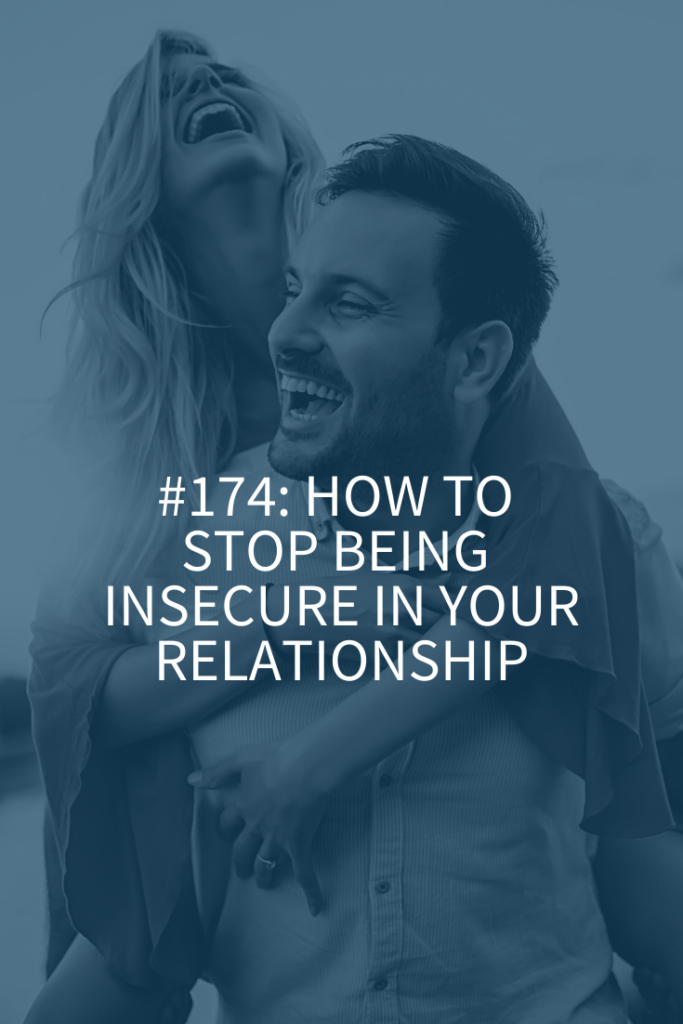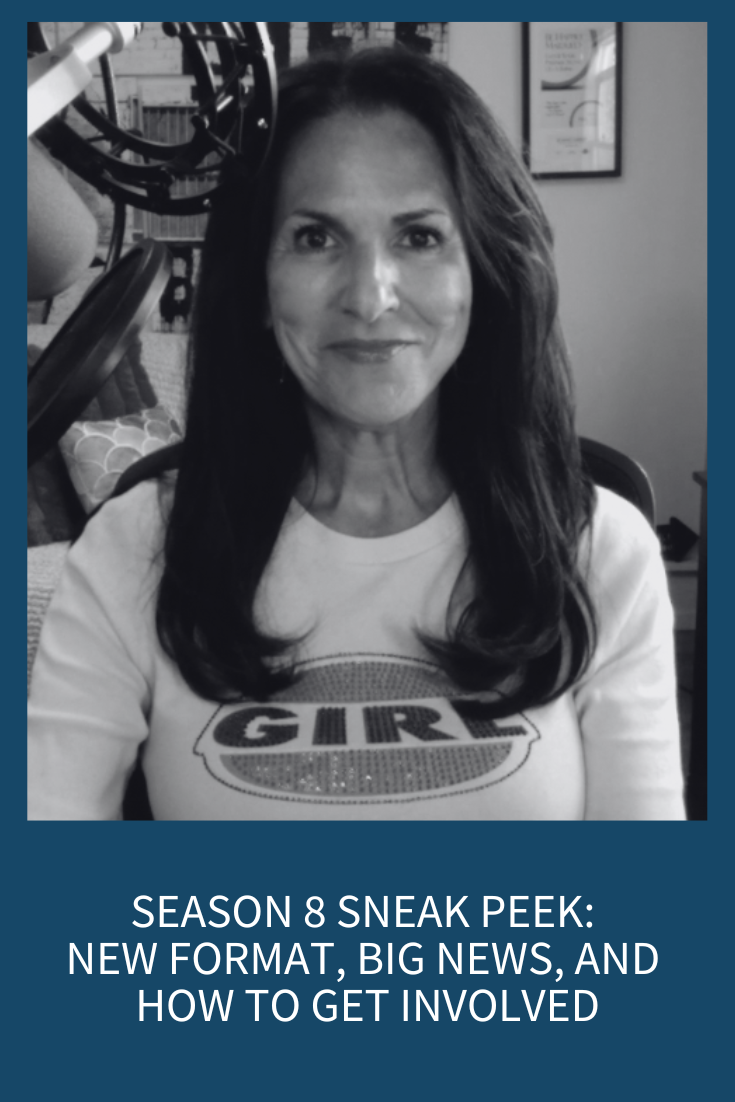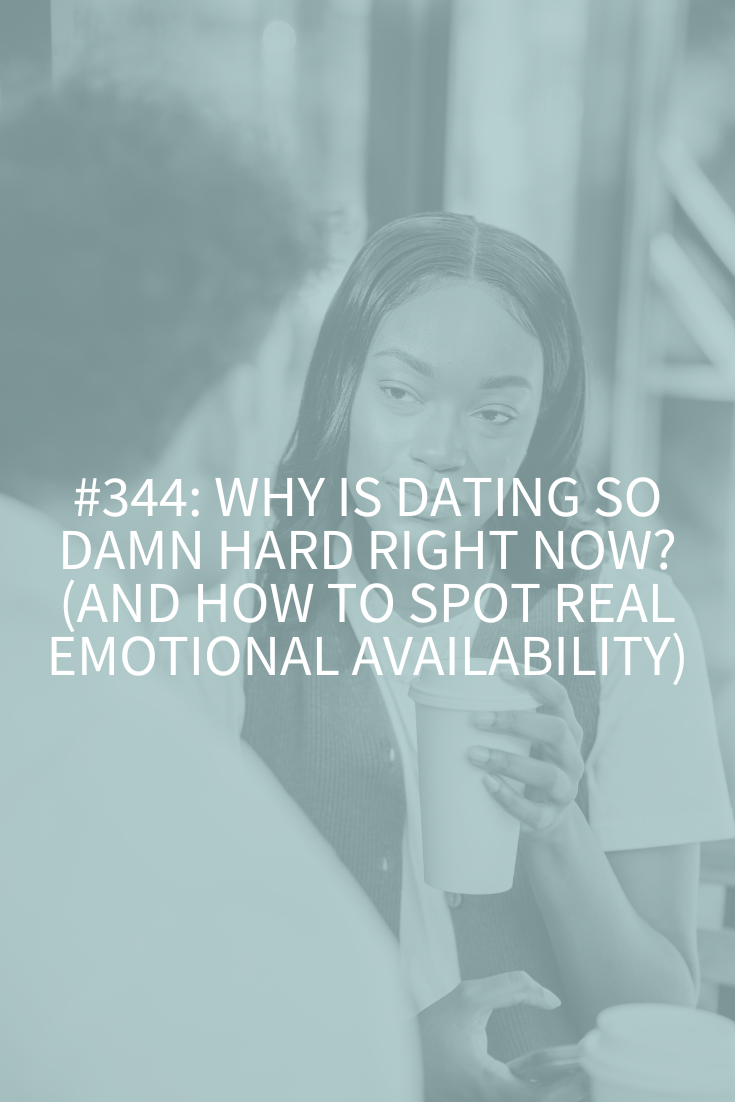
We all have self-doubt now and then, but chronic insecurity is a destructive pattern that’ll sabotage your relationships with everyone from your partner, to friends, coworkers and yourself. Most of the tips and tools I see about how to stop being insecure don’t work because they’re thinking about your insecurity all wrong. You say things like, “I’m insecure,” but being insecure isn’t a personality trait, it’s a habit of thought. And any habit can be changed with some intention and attention. With this different approach and the new tools you’ll learn today, you’ll be able to create a more secure feeling in your life and relationships.
12-minute read.
Prefer to listen to the podcast? Click here.
Why am I insecure, Abby?
So, where the heck does insecurity come from? There are a ton of theories about why you’re insecure and, as with most things, I think it’s a perfect storm: a combination of a few things that brings us to the point of being chronically insecure. Some of the more common reasons are:
- How you were parented. Maybe it was situational like not living somewhere safe, having an absentee parent or an alcoholic parent. Maybe you were constantly compared to your sibling or a neighbor. Maybe you had a learning disability and were terrified at school.
- Related to how you were parented. You might have developed an anxious, insecure attachment style.
- A major life event such as a violent crime, parents’ divorce at a critical time in your life, or a significant betrayal.
Want to learn about attachment styles and how they’re affecting your relationships? Click here.
While all these things from your past could be true and explain why you’re feeling insecure, your present thoughts and habits are why you’re insecure now. Taking time to blame your parents or an ex isn’t going to help you move from where you are, to where you want to be.
In my experience, clients spend a lot of time trying to get to the root of why they’re a certain way and while that can be helpful in understanding ourselves, at some point, it becomes mental masturbation. Because it’s what you’re thinking and doing now, no matter the reason, that’s giving you the results you see in your life.
You might be thinking right now that the reason you’re insecure is because of someone else.
- “I’m insecure because my boyfriend never tells me I’m beautiful.”
- “I’m insecure because I’m in a long-distance relationship.”
- “I’m insecure at work because my boss fires people even when they’re doing a good job.”
I’m not saying that other people can’t fan the flames of your insecurity but I’m here to tell you that your insecurity is about you and your thinking. Don’t blame your insecurity on anyone else – this is about you.
How Do You Stop Being Insecure? First, Understand the Why…
You’re Insecure Because of Your Habitual Thoughts and Actions:
- You constantly compare yourself to others
- You judge your decisions, words and actions harshly
- You believe that you’ll never measure up
- You believe that someone else’s opinions about your life and decisions are more important than your own
- You fear that you’ll never find a partner or another job
- You believe that you’re not OK unless you’re in a relationship
- You think that you’ll never find someone better than who you’re with
- You think that if you make a mistake, it’ll ruin your life or that one decision is going to blow your life apart
- You think that you’re not worthy of love
Signs of Insecurity in Your Relationships:
Some people are insecure but don’t realize they are! They have certain ways of doing things and don’t see that it’s motivated from a fearful, insecure place. Some common signs of insecurity are:
- Jealousy and accusing
- Fear of losing your partner, job or position in your family
- Constant trust issues, which will show up with a partner by snooping, questioning where they’ve been, checking up on them, asking for access to their emails and phone or checking their social media. At work it might show up as not believing your boss really likes your work (despite them saying they do) or thinking a coworker is out to get you (even though they seem to have your back). The trust issues can morph into a bit of paranoia when your insecurity is really out on a limb.
- Not speaking your true thoughts and feelings: at work this can mean you never give input at meetings and in your personal relationships this can mean never telling your mother or partner what you really want, need or feel.
- Asking for constant reassurance. From a partner this can look like: Do you love me? Is she prettier than me? Are you cheating? Why do you like me anyway? At work this can sound like: Did you really like how I did this? Are you sure I’m not getting fired? Can you tell me what you like about what I did?
- Not wanting to be alone and reaching out constantly.
- Trying to control your partner: who they spend time with and how they spend their time. Or trying to control information at work: who’s talking about you and what are they saying?
- Clinginess and neediness
How to Stop Being Insecure: The Four Habits for Getting Past Insecurity
1. If You Want to Stop Being Insecure, Make it a Habit to Focus on Now
You can’t be happy now if you’re always worried about the future or regretting your past. Sure, you’re sick of me talking about being mindful and staying in the present moment. But do I care? NO!! (I say with love). Because I know your happiness depends on it and I’m never giving up on you!
Here’s the deal. You feel insecure because you feel threatened even though there’s likely no real danger if you think about it. When you focus on being in the moment and how you feel in this very moment, you realize that you’re safe. That you’re OK. And there’s no need to feel threatened.
Your insecurity is lying to you. It’s your insecurity that’s sabotaging your job or your relationship. For example, you’re insecure in your relationship and worry that your partner will cheat on you so you’re constantly checking up on them. The constant scrutiny causes fights, and you break up or they do look for love somewhere else because you’re so unbearable.
Or you’re so insecure with your partner that you don’t tell them your real needs about something. They pick up on that deception (because that’s what it is) and feel frustrated that you’re hiding something, and this causes a breakdown in communication and closeness.
You’re insecure at work and so worried about losing your job that you don’t really do your job. You don’t offer new ideas or take risks. You’re constantly checking in and asking for reassurance, which is driving your boss and coworkers crazy. Or you get burned out because you take on too much and don’t draw boundaries and then start doing a poor job and ultimately get a bad review.
Maybe you’re not just worried about a future loss. Maybe you’re spending too much time focused on past mistakes. You regret decisions or bring up the past constantly. This too becomes a problem because your partner, friends or coworkers get sick of not moving forward and, eventually, become tired or frustrated with you. Then you see what you were fearing showing up and you think you were right to be afraid in the first place!
This all becomes a self-fulfilling prophecy and you’re falling victim to your confirmation bias and that Reticular Activating System.
The bottom line: if you want to stop being insecure, all that energy you’re devoting to worrying about the future or being depressed about the past is in the wrong place. Instead, start a new habit of being in the here and now and putting your energy into the now of your relationships.
2. Make Self-Compassion a Habit
Psychologist Kristin Neff is the reigning queen of self-compassion research. She was really the first person to operationally define the term “self-compassion” so we could measure and study it.
Neff says, “Self-compassion is about relating to ourselves kindly, as we are, flaws and all.” When you’re self-compassionate, you’re able to see the difference between making a bad decision and being a bad person. You understand that your worth isn’t conditional on a situation, something you said, or thoughts you might have.” Learning how to be self-compassionate is key if you want to have close, collaborative relationships.
Neff outlines three core components to Self-Compassion:
- Self-kindness: the idea here is that we treat ourselves as we would our best friend: with understanding, compassion, patience, empathy and gentleness (instead of being critical and judgmental).
- Recognizing our common humanity: this is all about feeling connected with others instead of feeling isolated. We all have struggles and you’re not so different. It’s not, how am I different than others? It’s how am I the same as others? Our struggles connect us to others, they don’t distance us from others.
- Mindfulness: Don’t ignore your pain and also don’t exaggerate it. Instead, be in the moment with what’s real.
3. Make Improving Your Self-Esteem a Habit If You Want to Stop Being Insecure
You can call it positive self-regard or self-love but self-esteem is really about having a good opinion of yourself. It means you don’t exaggerate your good or bad qualities and that you appreciate who you are in the world, warts and all.
Your self-esteem develops from a perfect storm of your temperament, your family of origin, and your life experiences, big and small. All these things come together and shape how you see yourself.
One of my gurus, Dr. Maxwell Maltz (who wrote the book Psycho-Cybernetics, which changed my life) said:
“Low self-esteem is like driving through life with your hand brake on.”
Learning ways to boost your self-confidence and self-esteem is a game changer! Next time you’re in a situation where you’re feeling insecure, try this quick exercise to boost your self-esteem and create a more realistic and grounded view of what’s happening:
Write down a list of what you bring to this situation or relationship. You have many things to offer, on many different levels, so make an exhaustive list of everything from your honesty to your Excel skills to your loyalty.
Then, look at where you’re putting the control. Is it on your partner or friend to reassure you? Whenever you’re looking outside for answers or to feel better about something you’re in a losing game. Instead, focus on what you can do in that moment to feel empowered or better about yourself.
Remember, insecurity is a habit of thought and you can break those habits by changing what you think about yourself and your situation. So, whenever you’re focused on what someone else should be doing so you can feel better, make it a habit to immediately ask yourself what you can do to feel better.
Ready to silence your inner critic and overcome insecurity? Click here!
4. Make a Habit of Holding Your Boundaries so You Can Learn to Trust Yourself
The real reason we feel threatened (and insecure) is because we don’t trust ourselves to hold our boundaries. Sure, it’s nice to focus on the other person as the reason, but what threat do they really pose if you’re confident and clear in yourself?
Let’s say that you’re acting jealous with your partner because you’re worried someone will “steal them” or that you’ll be taken advantage of. First of all, no one can “steal” your person. You’re fabulous, amazing and worthy. I say if your partner can be “stolen” then they weren’t the person for you anyway because fabulous, amazing and worthy people don’t act that way. But the real issue is this: what are your standards and what are your boundaries around those standards?
When someone isn’t respecting our boundaries it’s easy to feel insecure and blame them but it’s your job to know your boundaries and to have responses at the ready if they’re not met.
For example, let’s say you feel insecure with your boss. You think it’s because they’re always interrupting you when you share an idea or often dismiss your ideas in a condescending way.
I say it’s because you’re not holding your boundary around your standards. I’m assuming you have a standard to be treated with respect and you find these behaviors disrespectful. Well, what are you going to do? You can tell your boss you find their interrupting disrespectful. You can let them know that you’re going to share something and you’d like them to listen first before responding. You can tell them that their responses aren’t helpful.
Or maybe you’re feeling insecure with your partner. You think it’s because they make you feel guilty when you take time for yourself. They say you’re selfish and don’t care about them.
I say it’s because you’re not holding your boundary around your standards of how you’re treated in your relationship. I’m assuming you have a standard of mutual respect and autonomy. You could share with your partner that you enjoy spending time with your friends or that you need to take time to go to yoga class because it’s an important part of your self-care.
What’s interesting here, by the way, is that your partner’s insecurities are coming up and you’re joining with them! Instead, let them know how much you love them, but that autonomy and self-care are important for you to lead a happy full life. If they have an issue with that, that’s on them but be clear that you actually love them more when you love yourself more. How can you, as a team, feel confident and secure? Discuss how their jealousy or insecurity isn’t about you but about them (in a loving way, of course). In the end, you don’t take it on.
Now, here’s a warning. Once you start setting healthy, loving boundaries and practicing loving detachment, you’re going to get a LOT of push back from the people in your life because you’re changing the rules on them. They like it the other way, when you’re overly focused on their needs instead of your own. They like it when they get what they want. Who wouldn’t?
Your job is to stay clear, confident and loving (even at work) with where you are. Don’t explain or justify. You might find yourself needing to make some big decisions and changes with your job, friends, family and even your partner. But in the end, if you can’t count on yourself and keep looking to them, you’ll end up in fear-based emotions like insecurity, resentment and shame.
Wrap Up
I want to wrap up by reminding you this: If you want to stop being insecure, remember that it’s not about what the other person is doing, it’s about what you’re doing. Do you trust you to take care of you? It’s not their job to take care of you, it’s yours. You’ve got to trust yourself enough to know that you’ll stand up for yourself, leave, quit or whatever’s needed in a situation. When you trust yourself you won’t suffer from any real insecurity. You’re secure in knowing that you’re there for you.
At the end of the day, remember that whether you feel insecure or not is going to come down to your present habits of thought.
Resources
How Attached Are You in Your Relationship?
How to Make Mindfulness a Habit
The Complete Guide to Effective Communication in Any Relationship
Feeling Resentful or Stuck in Your Relationship? It Might Be Your Reticular Activating System!
Kristen Neff, Self-Compassion.org
Is Self-Compassion the Secret to a Happy Relationship?
Loving Kindness Guided Meditation
Maxwell Maltz, Psycho-Cybernetics
8 Ways to Build Your Confidence and Self-Esteem
Overcoming Insecurity and Silencing Your Inner Critic
Boundaries: How to Identify Them and How to Hold Them






